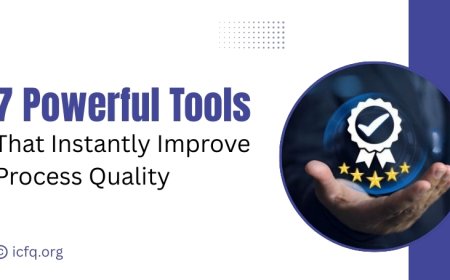The Efficiency of Six Sigma Tools
Learn how Six Sigma tools improve business processes by reducing defects and enhancing quality. See how they boost operational performance and achieve excellence.

Six Sigma is a methodology that focuses on improving business processes by reducing errors and increasing efficiency. It uses statistical tools to identify and remove causes of defects in any process, aiming to achieve near perfection. Six Sigma certifications are important because they show that someone has the skills to handle these improvements. The Black Belt level is especially significant. It indicates a high level of expertise and means the person can lead project teams, analyze complex problems, and drive significant improvements in the business. Getting a Black Belt certification can help professionals lead major projects and contribute to their company’s success at a higher level..
Understanding Six Sigma Black Belt Certification
Six Sigma Black Belt certification trains professionals to handle complex projects that aim to improve business processes. This advanced training covers deep knowledge of Six Sigma methods, which help identify and solve quality issues in company operations.
Black Belts are important players in organizations. They lead projects that focus on making processes more efficient and less costly. They're also responsible for analyzing data to find problems and figure out solutions. Besides managing projects, Black Belts helps train and guide other team members, like Green Belts, spreading their knowledge throughout the company. Their skills in managing detailed projects and solving tough problems make them key contributors to a business's success.
Benefits of Six Sigma Black Belt Certification for Professionals
-
Career Growth: Earning a Black Belt certification opens up opportunities for higher-level management roles within organizations, as it demonstrates a strong ability to lead complex projects and drive significant improvements.
-
Higher Earning Potential: Black Belt professionals often see a substantial increase in salary due to their specialized skills and their capacity to deliver impactful results, making them highly valuable to employers.
-
Enhanced Problem-Solving Capabilities: The training equips individuals with advanced analytical skills, enabling them to tackle challenging issues by identifying root causes and implementing effective solutions. This capability is transferable across various roles and industries, broadening their career prospects.
Organizational Benefits
-
Improved Process Efficiencies: Black Belts lead efforts to streamline operations, significantly reducing waste and increasing productivity, which can lead to cost savings and more efficient use of resources.
-
Competitive Advantages: Organizations with Black Belts are better positioned to maintain high quality and consistent output, which can differentiate them in the market. Their ability to solve problems faster and more effectively also allows them to adapt quickly to market changes and customer demands.
Overall, Six Sigma Black Belt certification not only accelerates individual career progression and earning potential but also significantly enhances organizational performance, making it a valuable investment for both professionals and companies.
Requirements and Process for Certification
Prerequisites: To start Six Sigma Black Belt certification, you usually need some professional experience, often a few years, and should have completed the Green Belt certification, though requirements can differ depending on the program.
- Training: Black Belt training is thorough, covering advanced topics like statistical analysis, project management, and problem-solving skills. The length of the training can vary, lasting anywhere from a few weeks to several months based on how intense and detailed the program.
- Examination: Once you finish the training, you have to pass a detailed exam that checks your understanding and ability to apply Six Sigma methods.
- Costs: The total cost to get a Black Belt certification can range widely, usually between $1,000 and $7,000. This includes the money spent on training, the exam, and any materials needed for study.
Maintaining and Advancing Certification
-
Continuous Learning: Black Belt professionals need to stay updated with the latest tools and techniques in quality management and process improvement to maintain their edge.
-
Recertification: Some certifying bodies require Black Belts to recertify every few years, which might involve continuing education credits, additional exams, or proof of ongoing projects.
-
Progression to Master Black Belt: For those looking to further advance, the next step is the Master Black Belt certification, which focuses on strategic implementation and mentoring other Six Sigma practitioners within an organization.
By following these steps and continually enhancing their skills, Six Sigma Black Belts can maintain their certification status and advance their careers, contributing to their organizations' success at a higher strategic level.
Preparation Tips
-
Study Materials: Invest in quality study guides and textbooks that cover the Six Sigma Black Belt body of knowledge comprehensively.
-
Practice Tests: Regularly take practice exams to familiarize yourself with the format and types of questions you will encounter.
-
Training Workshops: Participate in workshops and training sessions to gain practical experience and insights from experienced instructors.
-
Study Groups: Joining a study group can provide support and facilitate knowledge exchange among peers.
Career Opportunities
Professionals who earn a Six Sigma Black Belt certification have several career paths open to them, each focused on improving business processes and efficiency. Here are some roles they might pursue:
1. Quality Manager: This role involves overseeing the quality of products or services in a company, ensuring that everything meets set standards and customer expectations.
2. Operational Excellence Manager: In this position, a professional works to enhance the efficiency of company operations, striving to make processes smoother and more cost-effective.
3. Process Development Engineer: This engineer focuses on designing and refining production processes to make them more efficient and less prone to errors.
4. Continuous Improvement Manager: This manager is responsible for continually assessing and improving business processes, making sure the company keeps getting better at what it does.
5. Project Manager: A project manager with a Black Belt certification uses their skills to lead and manage projects that focus on process improvement, ensuring projects meet their goals within the given constraints.
These roles are crucial in any industry where process improvement and quality control are priorities, and they allow professionals to have a significant impact on their organizations' operational success.
Six Sigma Black Belt certification trains professionals in advanced skills for improving business processes and solving problems. This certification leads to career opportunities in roles like Quality Manager and Project Manager, and it helps organizations become more efficient and continuously improve. Overall, it benefits both individual career growth and organizational success by optimizing operations and maintaining competitiveness.





























